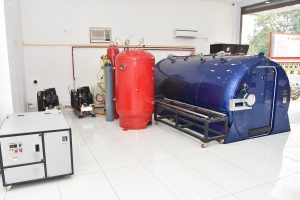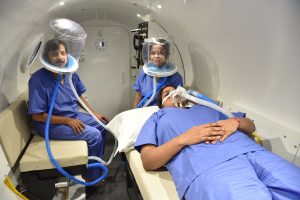Traumatic Brain Injury (TBI) has been a common topic in the news
recently, often mentioned in discussions of the danger of contact
sports like football. But did you know that millions of people in
the India suffer a traumatic brain injury
and post-concussion syndrome every year?
Slipping on an icy sidewalk, falling off a bicycle, or being involved
in a seemingly minor car crash can all lead to a
TBI, otherwise known as a concussion. As more
research is conducted on the causes, symptoms, and effects of TBI,
doctors and scientists are beginning to realize brain injuries are
much more complicated than once thought.
In today’s article, we’ll talk about the confusion surrounding TBI,
the side effects and symptoms of TBI including strokes, and how
research shows that Hyperbaric Oxygen Therapy could be a valuable
tool for TBI and stroke treatment and recovery.
Fast Facts: TBI and Post-Concussion Syndrome Causes
DID YOU KNOW: TBI may be hard to diagnose because
the injury can cause temporary memory loss. A person might not even
remember how he or she was injured– or that they were injured
at all!
- About 35% of TBI are caused by a fall
- 25% of TBI are the result of assault or an accidental strike
from a moving object
- 20% of TBI are the result of a motor vehicle accident
- The cause of the remaining 20% of TBI can’t be determined
TBI and Concussion Symptoms and How They Lead to Misdiagnosis &
Complications

Imagine two people involved in the same car accident. One loses
consciousness and the other remains alert throughout the accident.
One begins feeling dizzy a few days later while the other feels a
strong sensitivity to light (like the early stages of a migraine).
One starts experiencing a bad taste in their mouth while the other
is having trouble sleeping and feels angry and depressed.
Despite the incredible difference in their symptoms, both of
these people may be suffering from TBI or post-concussion
syndrome.
Modern research has shown that loss of consciousness is not always
associated with TBI. In addition, the symptoms of a TBI may not
become truly apparent for days (or even weeks) after the injury.
This delayed response can be confusing to first responders,
healthcare professionals, and TBI sufferers.
TBI & Concussion Symptoms : What to Watch For
If you’ve been involved in a car accident, fall, or received even a
minor head injury, you should be on the lookout for potential TBI
and post-concussion symptoms. More mild TBI symptoms may include:
- Headache, including migraine-like symptoms of sensitivity to
light and sound
- Vomiting or nausea
- Dizziness
- Blurry vision or ringing ears
- Tiredness or sleeplessness
- Depression, anger, or abrupt changes to mood and personality
- Loss of memory or trouble concentrating on even simple tasks
Severe TBI and concussion symptoms that require IMMEDIATE
medical attention include:
- Slurred speech and trouble with coordination and movement
- Convulsions and seizures
- Dilated pupils
- Numbness or tingling of arms or legs
- Loss of consciousness lasting more than a few minutes
Recovering from a TBI & Post-Concussion Syndrome
The unfortunate truth is that TBI recovery is unpredictable. Just as
the symptoms of TBI differ from person to person, the recovery
process and timeline varies widely.
Kendall Johnson, a Portland Thorns soccer player, received a
concussion and suffered serious symptoms for nearly a year. Two more
professional athletes Josh Beckett and Justin Morneau (both baseball
players) suffered brain injuries during games. Morneau, a former
MVP, eventually retired due to ongoing pain and symptoms, but
Beckett recovered in days without obvious lasting effects.
If TBI recovery is so inconsistent in professional athletes,
what can the average person do to maximize their chances of fast
recovery from a TBI?
Avoid Serious Complications
In addition to ongoing symptoms, TBI may put you at elevated risk of
serious complications like strokes. Accidents and head injuries may
result in damage to the brain’s blood supply. When this blood supply
is cut off, the result is a stroke and the death of healthy brain
cells.
The keys to minimizing the damage done by a stroke is early detection
and fast treatment.
F.A.S.T.
When it comes to strokes, remember F.A.S.T:
- Facial drooping
- Arm weakness
- Speech problems and slurred words
- Time to call 911– when these symptoms are
present!
Hyperbaric Oxygen Therapy (HBOT) For Stroke Recovery

Consider HBOT For Concussion and TBI TBI Treatment & Recovery
If you’re suffering from the ongoing symptoms of a TBI or concussion,
don’t suffer in silence! Look for treatment options that may provide
the relief you’ve been seeking.
At Urban Wellness Group, our physicians use an FDA-approved steel
hyperbaric chamber to treat TBI patients at pressures up to 1.3-1.5
ATA. This helps your body absorb more oxygen, a necessity when
you’re healing from a TBI.
Additionally, HBOT allows oxygen to infuse with many types of liquids
your body needs to heal, including blood, plasma, and cerebral
fluids. Through HBOT treatment, your body receives a boost in oxygen
where it’s needed most, helping to reduce the symptoms of your TBI.